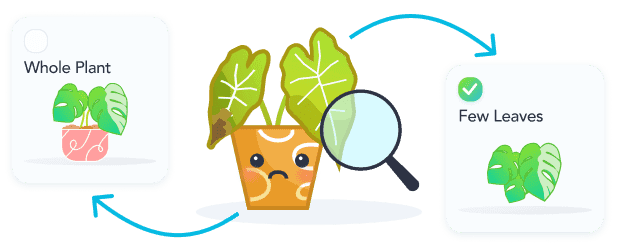Every 3d
Recommended Frequency
1 /2 cup of water
Recommended Amount
The Arrowhead Vine must be watered when the topsoil becomes dry to the to the touch; Make sure to water thoroughly. Remember to reduce watering during winter.
Every 30d
Recommended Frequency
Fertilize your Arrowhead Vine once a month during summer using a liquid fertilizer diluted by half. Do not fertilize in winter.
Indirect Sun
Recommended
Indirect Sun or Filtered Sun is when sun exposure is being filtered through a sheer curtain or is not able to have the sun's rays directly hit the leaves/flowers of your plant.
Every 730d
Recommended Frequency
Repot your Arrowhead Vine every two years, or once it outgrows its pot.
Peat Soil
Recommended Soil
Peat Soil is an acidic soil that retains a lot of moisture and slows decomposition. Due to such a high moisture retention this mix may require irrigation to help with draining. This soil type is best used when paired wit...
Arrowhead vine thrives in environments with humidity levels ranging from 50% to 80%, averaging around 65%. This indicates that the plant prefers high humidity to maintain its health and vibrant foliage. Summary: Arrowh...

Shop Arrowhead Vine
Questions about Arrowhead Vine
The Arrowhead Vine Plant, scientifically known as Syngonium podophyllum, is a popular houseplant known for its distinctive arrow-shaped leaves. It thrives in indirect light and moist soil, making it an ideal choice for i...

Toxicity of Arrowhead Vine

Common Pests and Diseases
Root Rot
Overwatering
To address root rot in arrowhead vine, first, cease watering immediately and allow the soil to dry out. If the plant is severely affected, remove it from its pot, trim away any black, mushy roots, then repot in fresh, well-draining soil. Ensure the pot has adequate drainage holes. Going forward, water only when the top inch of soil feels dry to the touch, and avoid letting the plant sit in waterlogged conditions.
Leaf Browning and Crisping
Underwatering
To address leaf browning and crisping due to underwatering, ensure the arrowhead vine's soil is consistently moist but not waterlogged. Implement a regular watering schedule, checking the soil moisture by touching the top inch of soil; if it feels dry, it's time to water. Consider using a self-watering pot to maintain consistent moisture levels. Additionally, during hotter months or in dryer indoor environments, increase watering frequency to prevent the soil from drying out too quickly.
Spider Mite Infestation
Spider mites are tiny spider-like pests that feed on the sap of the arrowhead vine, leading to yellowing leaves, webbing on the plant, and overall health decline.
To combat spider mite infestations, start by isolating the affected plant to prevent spread to other houseplants. Increase humidity around the plant, as spider mites thrive in dry conditions. Wash the plant gently with water to remove mites and their webs. For severe infestations, use insecticidal soap or neem oil, applying it according to the product instructions. Regularly check the plant and repeat treatments as necessary to ensure all mites and eggs are eradicated.
Bacterial Leaf Spot
Caused by various bacteria, this disease manifests as dark, water-soaked spots on leaves, often with a yellow halo. It thrives in warm, humid conditions.
To manage bacterial leaf spot, start by isolating the affected plant to prevent the spread. Remove and dispose of any infected leaves carefully. Ensure the plant is in a well-ventilated area to reduce humidity around the foliage. Avoid overhead watering to keep the leaves dry. If the infection is severe, applying a copper-based fungicide may help, but always follow the product's instructions. Improving air circulation and reducing leaf wetness are key preventive measures.

Related Plants
Other Articles:
Top 10 Most Popular Roses
Mar 22, 2022
How to Care for China Roses
Mar 11, 2022
How to Care for Chinese Money Plants
May 15, 2020
How to Grow and Care for A Bird of Paradise
Apr 26, 2020
Top 10 Plants To Grow In A Terrarium
May 31, 2022
How to Grow and Care for Lucky Bamboo
Mar 29, 2022
How to Grow and Care for Corn Plants
Mar 29, 2022
How to Care for Madagascar Dragon Trees
Mar 21, 2022



